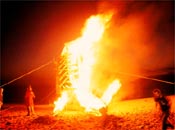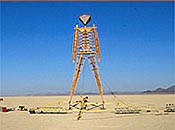LH: I’d never be forgotten! So anyway, what was I saying? So we’d… I’d done it as a private act, you know. I’d gone off to nurse my broken heart alone, but what happened is, four months later Jerry and I fell into casual conversation, and we both realized that… nearly at that same instant… when everyone materialized around it, we both almost unconsciously made the same decision in time. We’d do it again. We wouldn’t have done it again if it hadn’t created that community. And of course we’ve been doing it ever since. 1990, after burning the man on Baker Beach, we were, of course trying to smuggle a four-story… finally, in the… that fifth year, trying to smuggle a four-story giant onto a beach under the nose of the authorities. And… legs, three feet long, down a cliff, you know? Shhhhh, they won’t notice! It was pretty funny.
And finally, in that year, we… well I’ll tell you a little more of that story. We went down to the beach… now, we never assigned a burning… a meaning to Burning Man. That is, we never stopped to say “This is what it means, it represents this.” I remember we were constructing it one year, and a guy came over… we did it on a sidewalk, we didn’t even have shop space. This project has come out of poverty from its beginnings. But poverty is a great breeder of cooperation and culture. And he came up and looked at it and looked at it, wouldn’t say a word to us, kept looking at it, looked at the leg, and he says “Is that a gazebo?”
“No.” I explained, “It’s a giant man, we carry it, we take it out and we burn it, and…”
Then he looked at it for another five minutes and he said “You sure that’s not a gazebo?” You know, finally he walked away and he hit the other side of the street and I had pity on him and I ran after him and I said, “you’re right, it’s a gazebo.” I wanted to put his mind at ease.
We’d never assigned a meaning to Burning Man. And that’s for a simple reason. We started out as a little band of carpenters; my background is in landscape design. Jerry is, was, still is a… carpenter. And we, literally… you wouldn’t believe what we went through to make this thing. We had a garage so small… that…
[ How small was it? ]
LH: I’ll tell you how small it was! We used it as our shop and our storage, right, this was our warehouse, and so every night, always after dark, when we’d finish working on it, we’d hoist it up on ropes so it was right up on this low ceiling, and then we’d… and then it would take us an hour and a half to fit it together again like a Chinese box so we could close the garage door. And then we’d do the same thing in the morning, you’d repeat the same operation. We’d spend, you know, a quarter of the work day just unpacking and repacking it.
And we poured… the group that finally… evolved around it was a group of people who’d spend their entire lives constructing things. Carpenters, mainly, who had made houses, so they had no problem identifying with a man that looked like a house. All you had to do was add sheetrock, but then of course it wouldn’t burn, but… and so by the time we got through we were so invested in this thing it didn’t need to represent anything. It was us. We’d merged with it. We’d sweated over it. I know we… somebody cut their hand one time, bled all over it, you know. “A miracle! The Man bleeds!” It was that immediate a relationship because Burning Man has always been about immediacy.
The last year at Baker Beach, we came down there, and we had attracted larger and larger crowds, as we always have, through word of mouth. A certain kind of elementary excitement. And that year the authorities were there. We have a history, we have a history with the authorities, this year ain’t new… and they met us and said… “You just can’t burn that.” The guy looked at this thing lying on the ground and… well, first he said, “Stop everything!” So we stopped everything. We had radios… and so we said, you know… “Hold the leg!” Well, the leg was halfway down a cliff so they just stopped. And then we had to explain the situation to him, and we told him “Well, we have a… giant leg, on a cliff”… and I told him “I’m not Pharaoh, I can’t get it up there.” And then though he wants to do it, but we could bring it down, you know, that would be reasonable, and then perhaps we could go out to the parking lot.

And so he allowed that this would be a reasonable solution to this problem, and so we brought it down, and then he looked at it. And he goes up, and he looks at it, and he’s just amazed, he thought this was some kind of vandal… some piece of vandalism, is what he thought, I’m sure. And the thing just aches with craft. Clearly, this is the result of painstaking effort. And he’s looking all around and he’s “My God, how long did you”… and carpenters are gathered around, and… saying “Oh yeah, we”… and pretty soon a crowd is gathering around us, and they’re murmuring “Shame, shame… we’ve waited all year….” And he was… fortunately he was a man of conscience. And so he did a… he took a risk as an official. He said… we agreed that we could erect it, but not burn it. And then he promptly ran away. Because he didn’t want to see what we were going to do if we did burn it, right?
And so we erected it, but we weren’t used to crowds. You have to remember that this was a band that had grown up in a completely informal way, just the way all of you are organizing, in this informal but incredibly potent way, around a shared, creative act. And so we got the Man up, and then we turned around and we were surrounded by this big crowd, it was the first big crowd that we’d ever encountered. And it dawned on us that we didn’t have a P.A. system. We’ve come a long way. And we had no way of addressing them, or communicating with them, and then we were appalled to find out that… a great part of the party that had come down… it must have been something between six and eight hundred people, it looked like a real nation to us, and they were all up the bluffs, flashcubes everywhere… and suddenly we realized that… a lot of those people had nothing invested in what we’d done. They’d come for a spectacle. They’d just heard in town that there was this big man, they’re gonna burn it. They hadn’t worked with us. We hadn’t been conscious of ourselves as a community, we were just doing it. Then suddenly we were confronted with something that was the opposite of a community: we had a mob.
Now, mobs form when people feel anonymous and people feel isolated from one another. And then when strong passionate emotions surge through a group like that you’ll see a monster. And you’ll see the… worst actors among us suddenly thrust up as leaders. It’s their moment. And so people began to chant “Burn the fucker… burn it, burn it. Fuck you, burn it.”
And there was a crisis among us. There was a party that wanted to burn it. “Well, the cops ran away, we can do it.” I gave my word. I… I wavered. Then I heard someone say “Burn the fucker!” and my heels just sank in the ground. “No.”
So then we tried to tell them we weren’t gonna burn it. And it became a mob. It became a mob of disassociated individuals. And people ran forward trying to light it. We tried to wrestle them away. A fellow came up with a Bic lighter, three times, I made a mistake, on the third time, I touched him. I led him away twice before. He put his… he tried to strangle me… it took four people to peel him off.
But the scariest thing about that experience is I looked around and I saw people that I knew who were supposed to… who… men and women of good will, of character, who in any normal social situation would be leaders, who were walking around unmanned… and powerless to do anything in this disconnected social situation. I went home, I had nightmares. I dreamed about… I dreamed about natural disasters all night long. I kept waking up. I dreamt about the Titanic, I dreamt about the Dukakis campaign.
[ laughter ]
LH: You know, it was horrible. You know, where had we gone wrong? What had been a communion for us was just a cheap spectacle for them. And you know, our society anymore is largely organized around cheap, and expensive, spectacles. You know, television is cheap, Vegas is expensive… spectacles, in which you are anonymous, you’re passive, you consume a product, you share nothing with anybody, you go away, come back and get some more later when you feel empty again.
Well. We decided that we had to move the man. And when we did, we almost inadvertently found the solution to that problem. We had to find a place where we could burn it, safely. Where better than the Black Rock Desert, 400 square miles of nothing? And so we formed a party, the San Francisco Cacophony Society got involved, and here’s a group of individuals who, well, they are about the only group of individuals who would have been willing to do that. So the carpenters and the Cacophony got together and we managed to muster about, oh, 60 people, maybe 80 people, and we came out to Black Rock, which is this neighbor here, and we set it up and suddenly we made an interesting discovery.

It turns out that in this vast desert space… that there are peculiar properties, peculiar magic that takes hold. Suddenly we encountered something, it was like the ocean that had backed the Man before, this… great sweep of nature, that’s, that was always part of it. But this was an ocean you could walk on. This was a great piece of nothing in which anything that was, was more intensely so. Okay, in which with a few paper props and some 2 X 4s, like people do here now, you could invent a whole world around yourself, and there’s nothing to contradict it. You know, you could just be what you are and make that into a magic world. So we added something new in that.
First, we’d started out with the work ethic. You work together, you know if you help somebody… you know how it goes, you help somebody move out of their apartment and everybody sorts themselves into roles spontaneously, you do the job, and at the end of it you have the beer and you really feel good about that with everybody else, and well, we had that going for us. And then we came out here and we learned how to play together. And so we had that going for us and then we had one other element and that was the fact that to get here you had to make a commitment. So this was different from that riot on the beach. Now you had to come here and you had to survive in nature.

